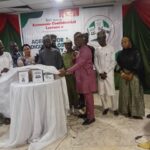CONAKRY TAKES THE LEAD AS ECOWAS HOST A STRATEGIC WATER SECTOR RETREAT.
-WRMC Head Office Moves to Conakry.
By Raymond Enoch
In a landmark move for sustainable development in West Africa, the ECOWAS Water Resources Management Centre (WRMC) convened a high-level strategic retreat in Conakry from August 18th to 21st, 2025. The gathering, held in the Guinean capital for the first time, marked a decisive turn in ECOWAS’ regional water governance, aligning its vision with pressing environmental and socioeconomic realities.

The retreat brought together senior representatives from the WRMC, the Strategic Planning Directorate (SPME), and the Fouta Djallon Massif Development Programme (PRAI-MFD) to refine the 2025–2035 Strategic Plan and finalize the 2026–2028 multi-year budget. It signaled not only a renewed urgency in tackling water-related challenges but also an intensified commitment to regional collaboration under the broader ECOWAS Vision 2050 and the current 2023–2027 Strategic Framework.
With water scarcity, climate variability, and transboundary river conflicts increasingly threatening the region, the WRMC’s agenda is no longer just administrative—it’s existential. The strategic retreat was framed as both a technical planning session and a political affirmation that sustainable water management is central to regional peace, food security, and economic resilience.
Officials reviewed past achievements, identified implementation gaps, and reaffirmed the need for harmonized approaches to water governance across West African states. PRAI-MFD’s contribution was especially significant, offering deep ecological insights from the Fouta Djallon highlands—a critical water tower for the region’s major river systems, including the Senegal, Niger, and Gambia rivers.
The retreat also celebrated a historic institutional milestone: the relocation of WRMC headquarters from Abuja to Conakry, a decision officially endorsed by the ECOWAS Conference of Heads of State in June 2025. This transition is more than symbolic. Guinea, with its abundant headwaters and geopolitical relevance, positions itself as a natural convener for regional water dialogue.
“This is a defining moment for Guinea and for ECOWAS,” said Dr. Salifou Diallo, WRMC’s Director-General. “By anchoring the Centre in Conakry, we are sending a clear message—West Africa’s water future will be shaped where its rivers begin.”
The 2025–2035 Strategic Plan emphasizes resilience-building, data-driven water governance, inclusive stakeholder engagement, and the mainstreaming of climate adaptation into all projects. Meanwhile, the approved 2026–2028 budget aims to unlock scalable funding for cross-border water infrastructure, groundwater mapping, early warning systems, and youth-led innovation in the water sector.
The retreat closed with a call to action for all ECOWAS member states to deepen political will, invest in shared resources, and embrace water as a tool for unity rather than division.










